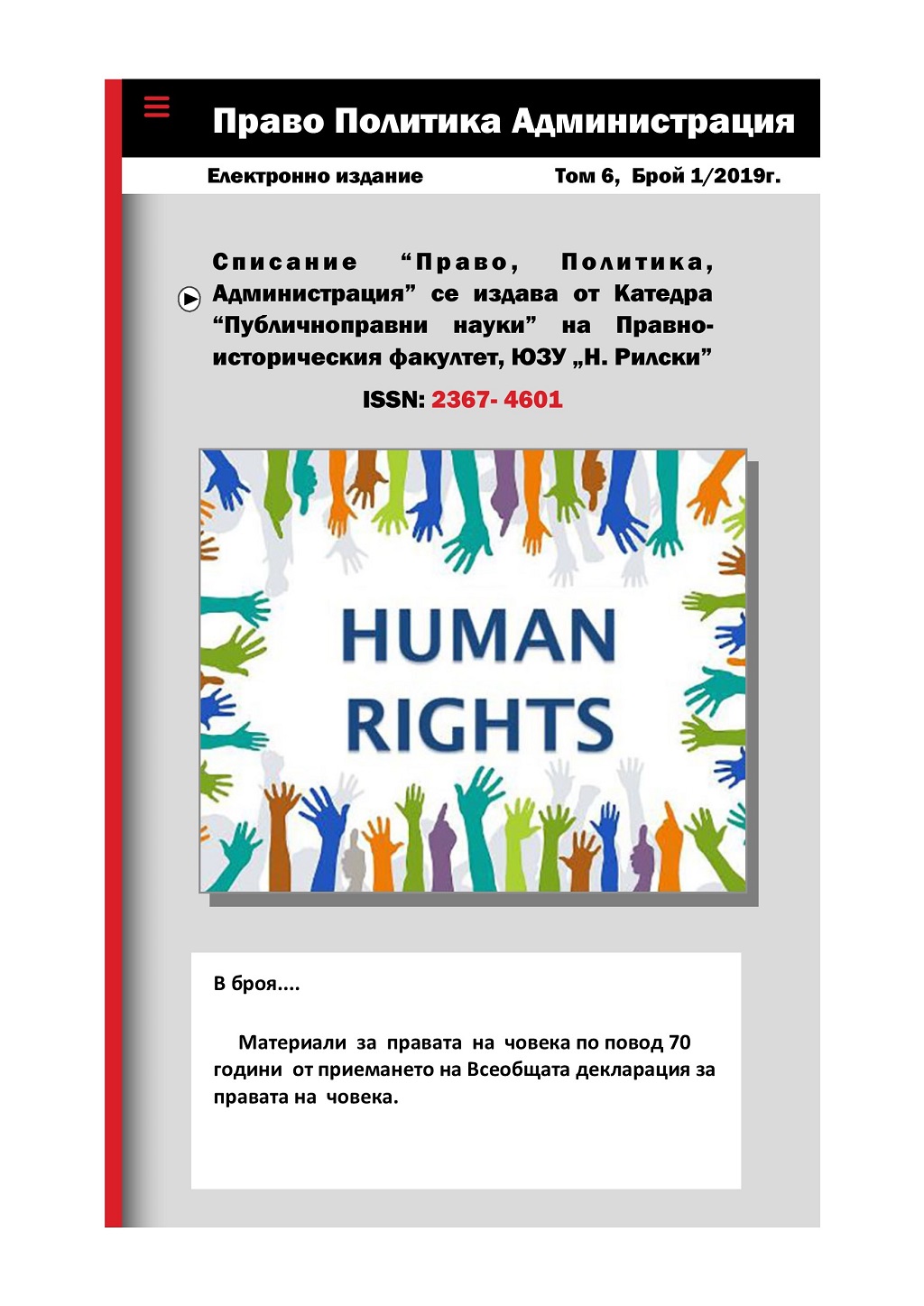
We kindly inform you that, as long as the subject affiliation of our 300.000+ articles is in progress, you might get unsufficient or no results on your third level or second level search. In this case, please broaden your search criteria.

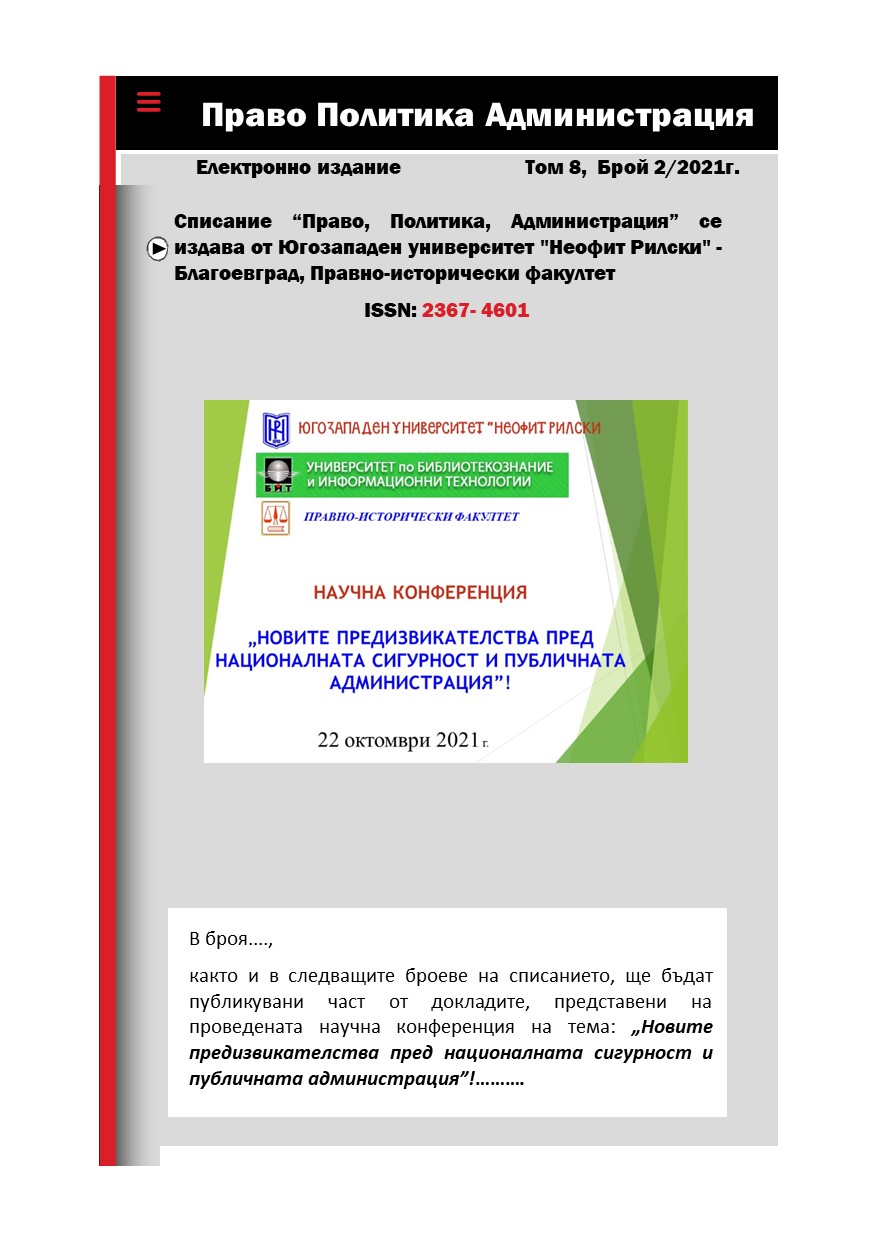
The right of legislative initiative is related to the law passing procedure. In the Constitution of the Republic of Poland as of 2 April 1997, the right of legislative initiative is discussed in the entire art. 118. Pursuant to the Constitution, the legislative initiative is applicable to members of parliament, the senate, the President and Council of Ministers, as well as a group of 100 thousand citizens entitled to vote for members of the Sejm. As for citizens, the procedure in this respect is regulated by the act. The right of legislative initiative is an entitlement of entities defined in the Constitution to submit a draft law to the Sejm. In Poland, the citizens’ veto is unknown and it is not possible to pass the law in a referendum.
More...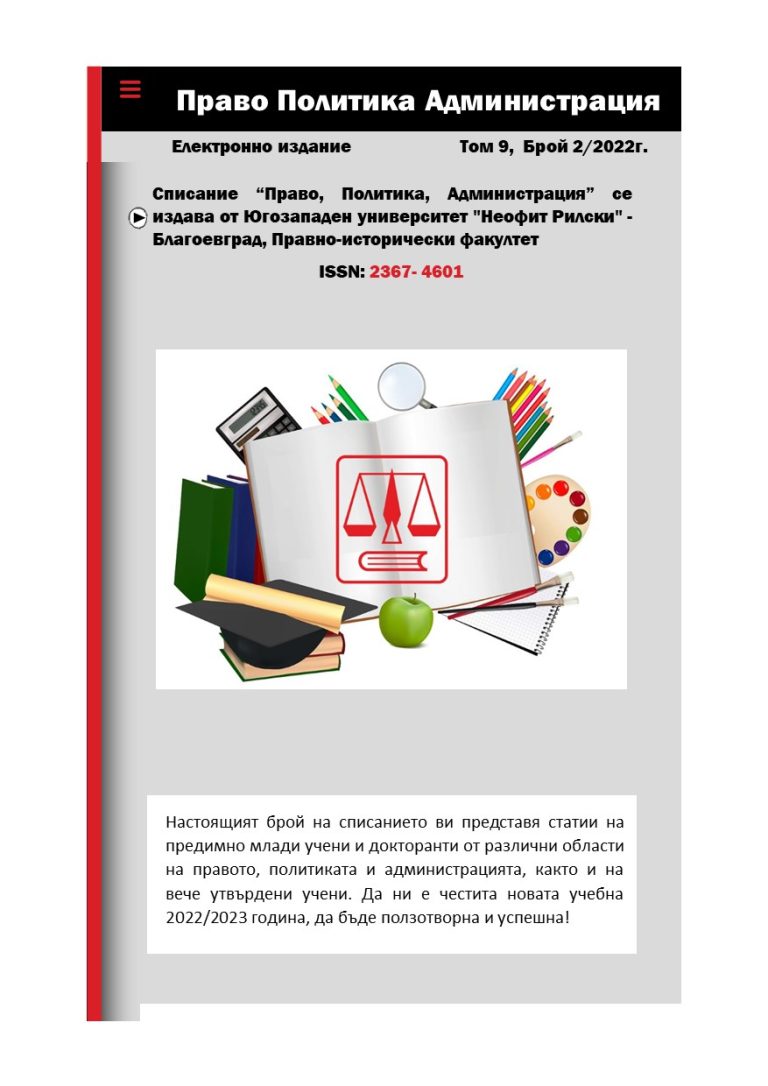
Does the disability have a constitutional foundation? What exactly is this complex socio-cultural, historical and political phenomenon? What is the place of disability in a modern constitutional society? These issues need to be analyzed and researched thoroughly in order to understand the extent to which the disability goes beyond the scope of employment-insurance or medico-legal issues and enters the territory of the constitution. It is necessary to consider the concept of disability, to analyze constitutionalism as a fundamental issue in the rule of law, as well as to examine the role and place of disability in it.
More...
The purpose of the research is to outline the circle of entities that have the right to legislative initiative in the Republic of Bulgaria. Specific moments in the exercise of the right of legislative initiative by the Members of Parliament and the Council of Ministers, which have prevailed in the parliamentary practice and the constitutional doctrine, have been brought out. Attention has been paid to the current trends regarding the main sponsor of the bills according to data from studies of legislative activity. The topic of expanding the range of subjects of the right to legislative initiative, which is increasingly becoming topical and at the same time causing debate, is also touched on.
More...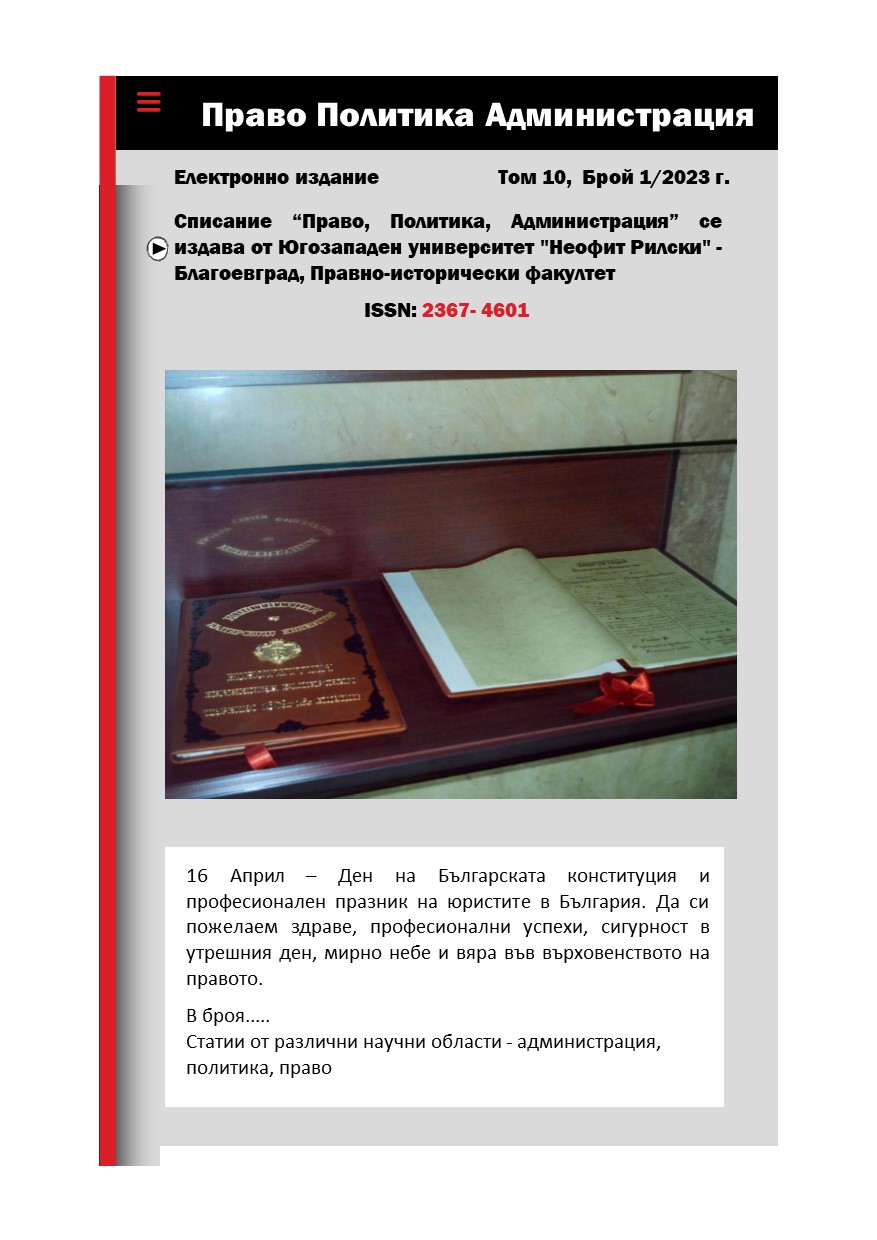
The article is concerned with a detailed issue related to the so-called „revival of regulations” originated in Austria. The point of departure is the fact that if the act is to be repealed by way of the decision of the Constitutional Tribunal due to being at variance with the constitution, when the repeal becomes effective, regulations of the act previously repealed by way of the act acknowledged by the Constitutional Tribunal as at variance with the constitution become valid again. The effect for the legal system is considerable and debatable. In Poland this matter has not been finally solved yet as regards the implementation of the decision to „revive”. In Austria in turn these issues are regulated by the art. 140 para. 6 of the Federal Constitution of Austria.
More...
Objectives:Paper analyses the Constitution of the Republic of Poland’s limits for restricting the legislature that requires high legislative standards in area of real estate tax.Material and methods:The analysis is based on the Constitutional Tribunal’s jurisprudence in the field of real estate tax that is primarily connected with taxation of entrepreneurs’ real estate. The method of dogmatic and legal analysis was used.Results:The analysis of the case law of the Constitutional Tribunal concerning the assessment of real estate tax regulations allows the conclusion that the judgments concerned the two most significant practical problems (i.e., taxation of buildings and real estate connected with business activity). In almost every case the Constitutional Tribunal found the Act on Local Taxes and Fees provisions to be at least far from the standards that should be expected from tax regulations.Conclusions:The source of the all legal problems is not only historical (i.e., from defective regulation of these issues 20 years ago). It seems that the current legislators are still resistant to proposals concerning profound legislative changes, including those indicated as necessary by the Constitutional Tribunal, the Supreme Administrative Court and the doctrine. A further problem is that the cascading definitions of terms using non-tax laws and the phenomenon of so-called unconscious tax legislation, which definitely affect the negative assessment of regulations, seem to be intensifying. This is evident in the recent changes in the scope of tax exemptions for railroad infrastructure or the taxation of windmills. It should also be pointed out that the authors of the proposals for legislative changes and the legislators in the background should at least take into account that tax revenue is the income of the community budget.
More...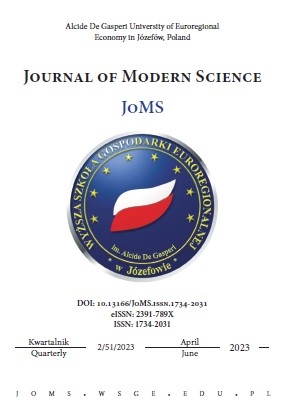
The analysed matter concerns the examination of a constitutional complaint of a person who died after filing it. This issue has not yet been the subject of wide interest in the Constitutional Tribunal and the science of constitutional law. However, there is no doubt that it is a significant issue, requiring in-depth analysis – particularly in view of the two contradictory opinions expressed in the jurisprudence of the Constitutional Tribunal. On the one hand, the Constitutional Tribunal recognises that the applicant’s death in the course of the proceedings does not constitute a reason for suspension or discontinuance of the proceedings initiated by a constitutional complaint, as it is crucial to examine the constitutionality of the challenged legal norm. On the other hand, in other rulings, the Constitutional Tribunal (CT) states that the basis for the effective filing of a constitutional complaint is the applicant’s legal interest, which ceases upon their death. The purpose of this paper is to discuss the issue related to the examination of a constitutional complaint in the situation of the subsequent death of the person who brought the complaint from the perspective of the general legal interest related to its examination and the objectives associated with the examination of the complaint by the Constitutional Tribunal (CT).
More...
In South Africa, freedom of testation has been an enjoyed practice since ancient times. It gave testators comfort in knowing that when they departed, their legacies and property would be looked after by those they had chosen to survive their estates. Before the advent of the Constitution, testators used to abuse this freedom. There existed a tendency to exercise this freedom without limitations. However, the Constitutional epoch brought about changes in the manner the testators exercised their freedom of testation. Amongst other things, was the limitation to freedom of testation. Legislation and Common Law also contributed to restricting or limiting this freedom. Against this backdrop, this article investigates the impact of the Constitution on freedom of testation in South Africa under the current constitutional dispensation. The paper is predicated on the assumption that freedom of testation gave testators leeway to promote discrimination and unfairness. Therefore, this paper will show that freedom of testation has evolved and is no longer absolute in South Africa, with the Courts playing an important role in the process.
More...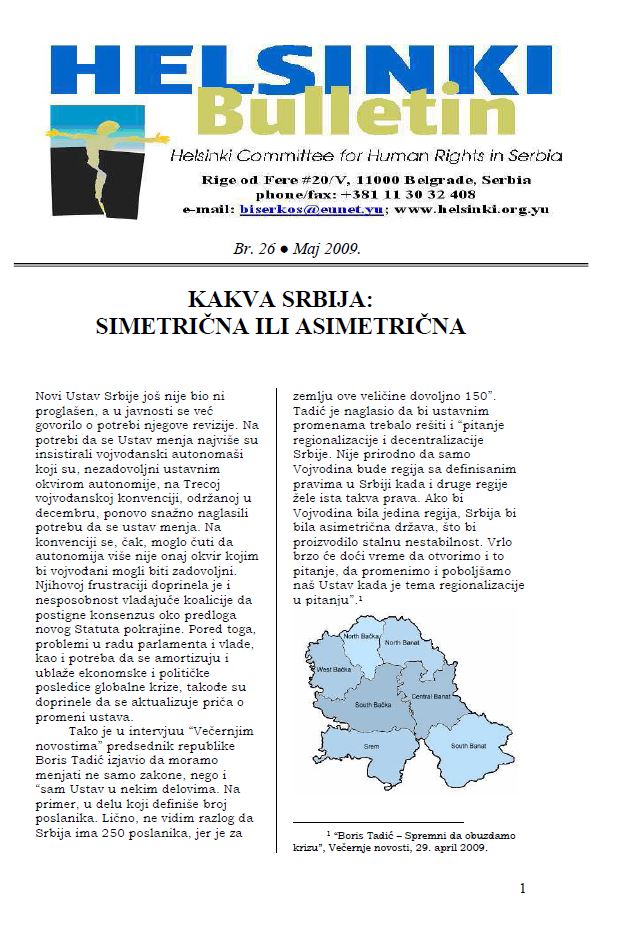
A public debate on constitutional revision begun even before Serbia’s new 2006 Constitution was declared. Dissatisfied with the constitutional frame for Vojvodina’s autonomy, the province’s autonomists mostly insisted on the issue. At the Third Vojvodina Convention last December they once again emphasized the need for constitutional amendment. Some speakers at the convention even said that autonomy was no longer a frame that could satisfy citizens of Vojvodina. Inability of the ruling coalition to reach a consensus on the draft Vojvodina statute just fueled their frustrations. In addition, the problems hampering parliamentary and governmental proceedings, and the imperative need to buffer political and economic effects of the global crisis brought constitutional amendment to the fore.
More...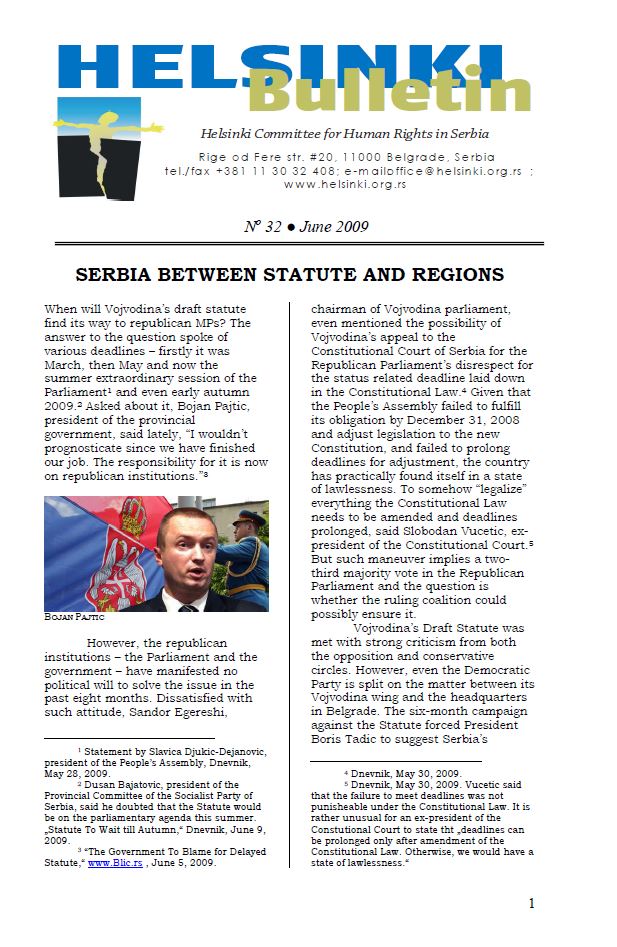
When will Vojvodina’s draft statute find its way to republican MPs? The answer to the question spoke of various deadlines – firstly it was March, then May and now the summer extraordinary session of the Parliament1 and even early autumn 2009.2 Asked about it, Bojan Pajtic, president of the provincial government, said lately, “I wouldn’t prognosticate since we have finished our job. The responsibility for it is now on republican institutions.”
More...
When will Vojvodina’s draft statute find its way to republican MPs? The answer to the question spoke of various deadlines – firstly it was March, then May and now the summer extraordinary session of the Parliament1 and even early autumn 2009.2 Asked about it, Bojan Pajtic, president of the provincial government, said lately, “I wouldn’t prognosticate since we have finished our job. The responsibility for it is now on republican institutions.”
More...
The newly adopted Statute fits into the legal frame of the 2006 Constitution. However, Vojvodina will hardly be in the position to fully effectuate the powers transferred to it under the Statute unless it controls all of its resources. Given that the Law on Transfer of Authorities fails to define some crucial questions such as property and finances the actual implementation of the powers the province has been invested with remains to be seen.
More...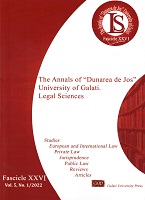
Starting from 2011, the competence of the Constitutional Court of the Republic of Moldova in relation to that of the courts was unclear and unstable, which depended on the interpretations given by the Constitutional Court itself. In particular, we are referring to the competence in examining applications regarding contesting the decrees of the President of the Republic of Moldova and the Decision of the Government of the Republic of Moldova. In the last period, the Constitutional Court carried out such a different practice, that in some cases it stated that the control of some Decisions of the Government of the Republic of Moldova belonged to the competence of the courts of common law, and in other cases the same Government Decisions considered to be the object of the constitutional jurisdiction. From the analysis of several decisions of the Constitutional Court, we found that the litigants faced a deep problem when they determined at which court they would challenge the decrees of the President of the Republic of Moldova and the Decision of the Government of the Republic of Moldova. That's why, in this paper we sought to present this problem that existed in judicial theory and practice, and we submitted recommendations for the resolution of this conflict of competence. We also started from Romanian specialized literature, which mentioned that the object of constitutional jurisdiction is entirely particularized. An important solution is that the Moldovan legislator is to stipulate in art. 135 lit. a) from the Constitution of the Republic of Moldova, the particularities of the decrees of the President of the Republic of Moldova and the Decisions of the Government of the Republic of Moldova that can be subject to constitutional jurisdiction.
More...
Revision of the Constitution needs political consensus. Therefore, the control in itself over any Constitutional Amendment has both a political origin and a legal application. The article reaches the conclusion that the power of Constitutional revision additionally requires jurisdictional control over this power. Some theoretical views and their practical application are presented. The study also focuses on the latest ruling of the Constitutional Court in the context of the Sixth Amendment to the Constitution of the Republic of Bulgaria.
More...
The article discusses the interpretative directive in dubio pro vita humana (Latin:„when in doubt, favour human life”), as well as its popularization, including encouragingpublic administration bodies and courts to apply it more widely. The article aims to answerthe following research problems: What are the main sources of the in dubio pro vita humanadirective in the Polish legal system? What is its content and its key assumptions? What arethe potential implications of its application in legal practice? What is the object-related scopeof its application?The formal-dogmatic method is used in the study.The interpretative directive in dubio pro vita humana is rooted in the constitutional protectionof human dignity, life and health. It is confirmed in the views expressed by legal scholars, aswell as in the case law of the Constitutional Tribunal and administrative courts. However,in order to increase the scale of its application in practice, it should be regulated by law.The content of the directive is such that it requires any possible doubts about the protectionof human life to be resolved in favour of this protection. Applying this directive is pivotalfor ensuring institutional healthcare in Poland by choosing such a result of interpretation of provisions of law that maximizes the protection of human life and health. Its object-relatedscope of application is most strongly linked to healthcare law, but it is also applicable to theinterpretation of provisions in other branches of law (for example, in criminal or welfare law),even if prima facie they do not seem directly related to the protection of human health and life.The results are important not only for Polish law, but also for the interpretation of foreign lawsand EU law. It seems that this directive may also find its application outside the legal system– for solving ethical problems. An offshoot of this study is the possibility of referring at leastpart of the comments made to the legal protection of animals, which may contribute to itsstrengthening and to development of legal science in this area (in dubio pro vita animalium).
More...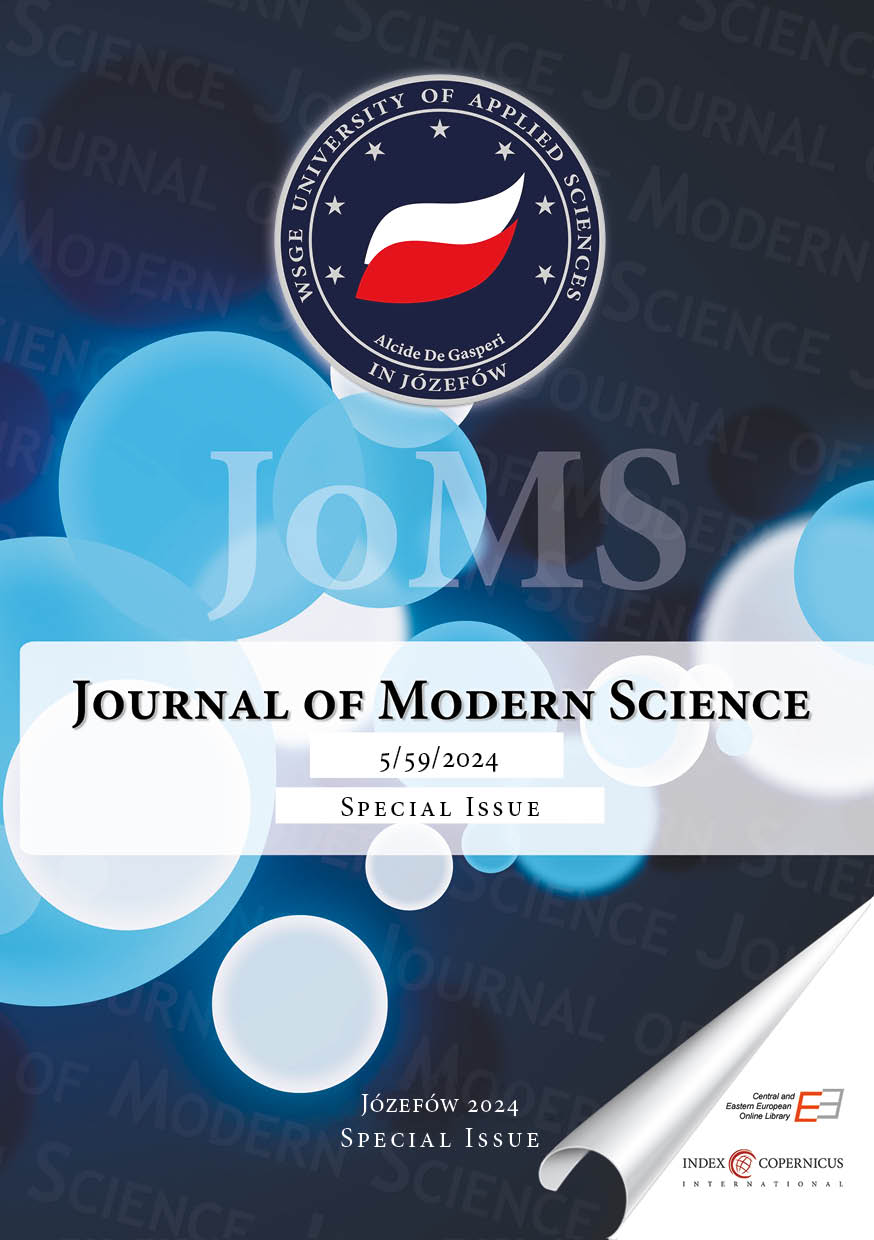
The article is devoted to the role of administrative courts in ensuring the legal security of an individual in the area of family law. The aim of the analysis is to demonstrate the guarantee of the preservation by the Polish constitutional legislator of the traditional form of marriage as a union of a woman and a man and the family created on this basis (Article 18 of the Constitution of the Republic of Poland). The article discusses the essence of legal security and the role of administrative courts in ensuring it, as well as the guarantee nature of the regulations of Article 18 of the Constitution of the Republic of Poland. Against this outlined background, the thesis on the inadmissibility of institutionalization of same-sex unions is argued. Problems resulting from the judicial practice of administrative courts related to the transcription of a child's birth certificate are also discussed. The scientific research was conducted by using traditional methods of jurisprudence, primarily the formal-dogmatic method. The linguistic, systemic and teleological interpretation of Article 18 of the Constitution of the Republic of Poland was applied. The directions of operational interpretation resulting from the case law of administrative courts were discussed. The views found in the literature on the subject (doctrinal interpretation) were taken into account, too. According to the author, the perspective of legal security strengthens the arguments stemming from the linguistic and historical interpretation of Article 18 of the Constitution and allows for a better justification of the inadmissibility of institutionalizing same-sex unions by means of a statute. Such a procedure seems particularly useful in the face of the growing tendencies in the law of other countries to eliminate the traditional form of marriage as a union of a woman and a man.
More...
The article is intended to analyse the possibility of implementing electronic injunctive proceedings into the Polish criminal procedure. The rationale for that action, the positive aspects and the barriers to the implementation of the proposed solutions have been identified. The author analysed the historical development of injunctive proceedings and subjected the existing regulations to legal-dogmatic analysis from the perspective of the solutions proposed. The results of the study pointed to the possibility of electronization of the injunctive proceedings, presenting a broad justification for this direction of change in the criminal procedure. The author proposes two stages of modification of the electronic injunctive procedure, distinguishing the electronic injunctive procedure of the first degree and of the second degree. As part of the 1st-degree electronic injunctive procedure, it was proposed to electronize individual procedural acts, in particular the service of procedural documents and keeping the court records, but also to change the jurisdiction of courts which decide cases through injunctive proceedings, by establishing one or a maximum 2 to 4 courts dealing exclusively with injunctive proceedings. Depriving district courts (sądy rejonowe) of the competence to consider injunctive cases would, in the author's opinion, accelerate the consideration of other criminal cases. The 2nd-degree electronic injunctive procedure would include an element of AI implementation, which should be subject to evolution, starting from the proposing of a substantive resolution of the case to automating the process of issuing injunctive judgments.
More...
The concept of abusive constitutionalism became widespread in legal scholarship after David Landau's famous publication. The author defines abusive constitutionalism as "the use of constitutional amendment mechanisms to make a state significantly less democratic than it was before" . He refers to actions that make a particular regime "significantly less democratic" . The result, he points out, is to move away from democracy . He pointed to 2013 as examples of this trend - Honduras, Venezuela or Hungary. "De-democratisation" of constitutional mechanisms is also, in my view, relevant from the perspective of the Polish experience, though viewed differently than usually presented in the political debates. It turns out that democratic mechanisms and their implementation are undermined by those judiciary representatives who, simultaneuosly, accuse the authorities introducing solutions in line with democratic principles of violating the rule of law.
More...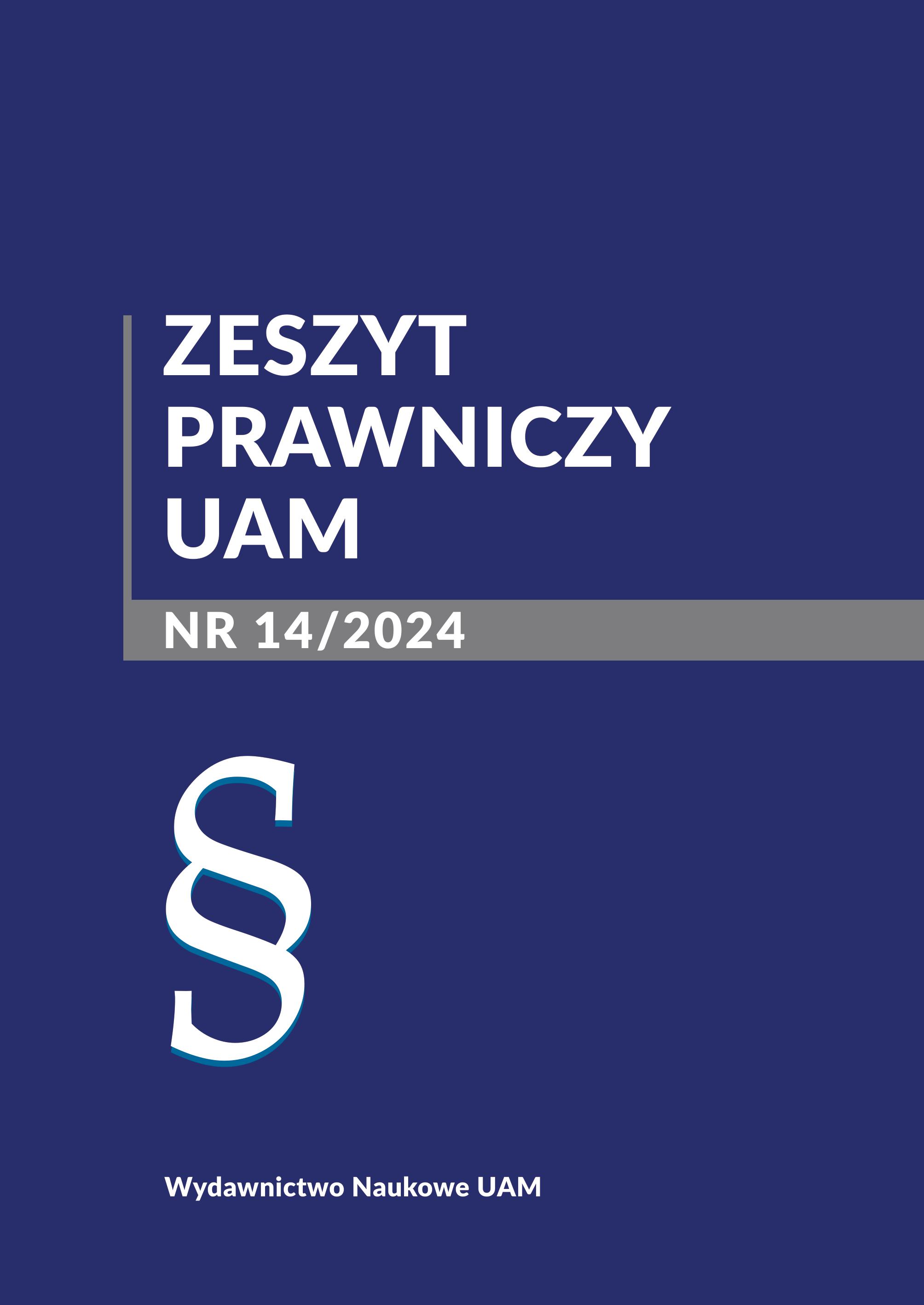
The purpose of this study is to explore the essence of the institution of clemency in the current Polishlegal order, determine its place in the legal system, and examine its construction and purposes. The considerationsoutlined above are related to a specific, highly significant case of the use of the presidential pardon, which sparkedenormous controversy. Special attention is given to examining the correctness of such an action from the legalperspective. As the consequences of using a pardon in this manner are particularly linked to the phenomenonof the instrumentalization of the law, the issue is also analysed from this point of view.
More...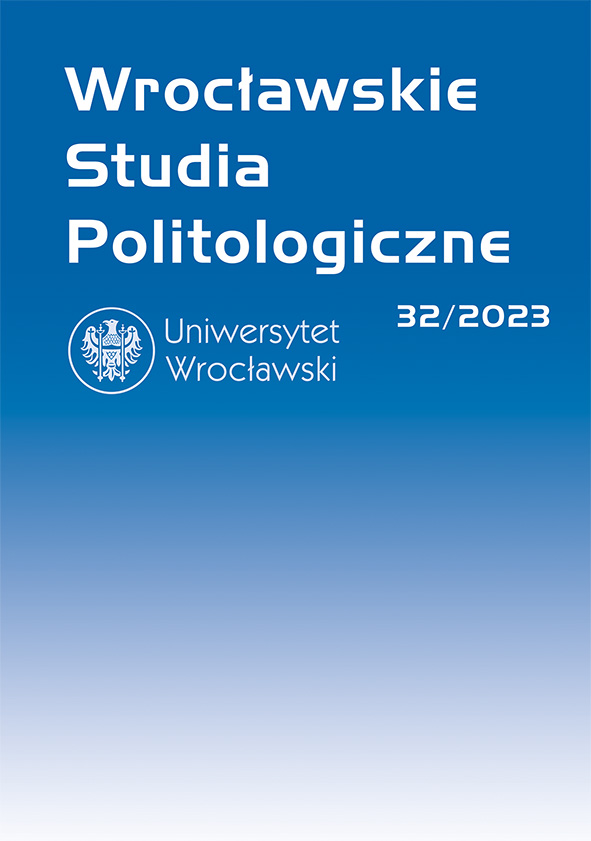
Th e principle of neutrality of the armed forces is one of the pillars of their functioning as the body guarding Poland’s security. Members of the armed forces, as well as the armed forces as a whole, are absolutely obliged to comply with this principle. Th is article discusses the legal, in particular constitutional, regulations of the political neutrality of the armed forces. An analysis of statutory provisions relating to the subject matter is also provided.
More...